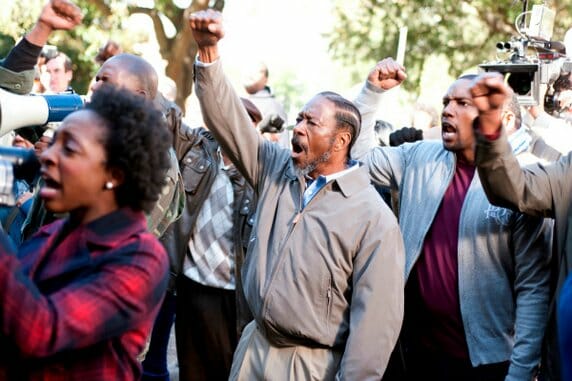
At its best, Treme is essentially a post-Katrina version of Robert Altman’s masterpiece Nashville, only with more authentic (and, frankly, better) music. Of course, the time period is a pretty key part of the show, and also makes the show have more of a plot than Nashville did, not to mention the show’s serial nature. As time moves on, the city and its people need to change, but that doesn’t mean that very plot-based storytelling works particularly well for the show’s large cast and musical focus. Procedurals require something closer to linear storytelling, and that’s simply not what Treme does well.
Fortunately, “I Thought I Heard Buddy Bolden Say” returns the show to its more meandering, lackadaisical roots—which isn’t to say that nothing happened in this episode, since just the opposite is true. Essentially the episode had two centers and just showed us how its characters responded to these events, at times intersecting but frequently not. One of these events was local and specific, when the city council votes on destroying some of New Orleans’ housing projects and a riot ensues, while the other one is more universal: celebrating Christmas.
Of course the riot is far more dramatic, and doesn’t pull any punches when it comes to showing police brutality in the face of the oncoming rioters. These are powerful visuals, a gang of heavily armed, uniformed white men tasing, pepper spraying and arresting a group of largely black protesters. When a local news clip later mentions how it looks like something straight from the 1960s, well we didn’t need to hear that because we already saw this. The riot intentionally recreates images of 1960s civil rights movements, and what we see is horrifying.
With those images in mind, Treme offered multiple discussions as to how to interpret what happened, but it completely reframes the conversations after we’ve seen this violence. One of my favorite moments in the episode came when Albert’s daughter mentioned how at least the police showed restraint, but of course Albert’s still in pain from the pepper spray shot in his face. It was restraint compared to what happened in the 1960s, but that doesn’t mean there wasn’t violence. Then at Davis and Annie’s Christmas dinner, you have Davis’s family arguing about the vote and his wealthy mother taking the side that the housing projects had to be destroyed. But of course, if they had to be destroyed, then why were there men and women being beaten and arrested in their attempt to save these from destruction.
The riot was the most memorable part of the episode, but I also enjoyed the show’s return to a certain extent to the “terrible things are happening, let’s see a show” mentality that it’s been missing at the beginning of the third season. When Desiree’s father’s house is destroyed, she realizes she’s powerless at the moment and attends Antoine’s gig. Like Albert, I’m sure Desiree will fight the city for this outrage, but that will have to wait.
Another great juxtaposition from the riot comes with the offer made to Delmond (and his father) in helping with the creation of a National Jazz Center. Here the city is, knocking down the projects that as Davis later tells us gave birth to a wide swath of great musicians, yet at the same time wishing to honor them by creating this landmark. The only question is, can this be done right? When Delmond asks about a fence cutting off the Treme area, we know that this isn’t a small question, though it sounds like that to everyone else. The question is to whether they care enough about the community to remove it and embrace all strands of the city’s life, not just the wealthy, and this may ultimately determine his involvement and the center’s success.
This episode of Treme got the show back to what it knows how to do best: explore questions about the world (post-Katrina, but frequently more universally) through a variety viewpoints. One thing that David Simon has never shied away from is exploring how much class and race play a part in so many decisions, and how easy it is to be blind to these facts. Race played a big part here, but class and wealth, issues that so much of America wishes to pretend aren’t large determining factors—”class warfare” has somehow become a slur to some segments of the country—were just as big. This is a city and a situation being shaped by money, and people like Desiree and Albert and even to some extent the middle-class like Janette are being disenfranchised by a system more concerned about cash than people. This was an episode where huge things happened but so did very little, told to us subtly through two dozen sets of eyes—it’s hard not to think that Altman would be pleased.
Stray observations:
•I really love the way Davis’s knowledge of anyone remotely noteworthy in New Orleans creeps everyone out. I wish we could’ve seen more of him and Delmond together.
•”Preservation through Neglect.” – Davis on New Orleans cultural heritage.
•I was so surprised the police officer didn’t plant pot. I guess that’s the difference between New Orleans and my hometown of Albuquerque.
•And I went that whole write-up barely mentioning Annie’s parents visiting. They were perfectly cast, and Isabella is still a wonderful actress. Suddenly Annie makes sense.
•Definitely the first time I’ve ever heard the term “vernacular music.”
•Davis’s family dynamic at holiday dinners is a lot like my own. Yeah, it does tend to scare off any guests.